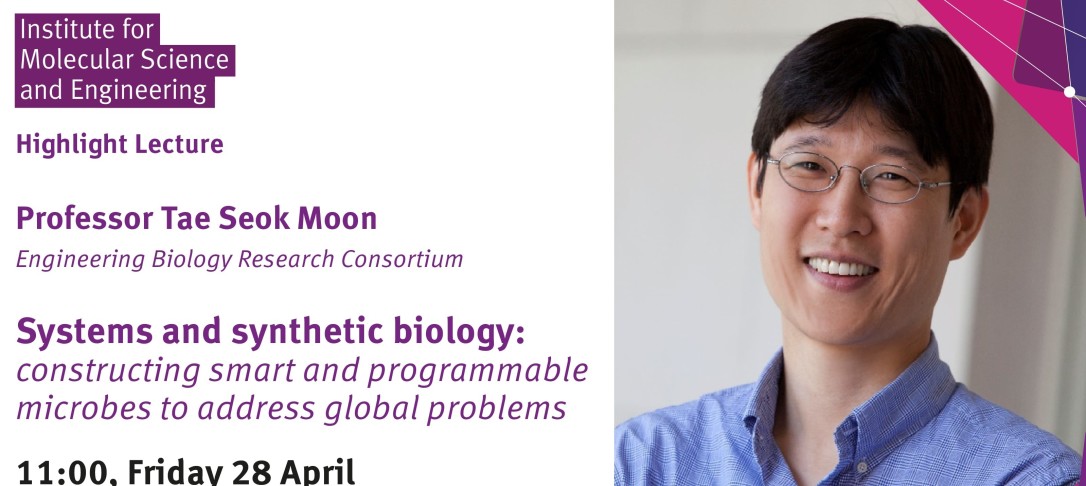
Systems and synthetic biology: constructing smart and programmable microbes to address global problems
When and Where
The lecture will be held in Pippard Lecture Theatre, Sherfeild Building Level 5, Imperial College South Kensington Campus and online via zoom.
Abstract
The past decade has witnessed the tremendous power of systems and synthetic biology in the creation of genetic parts, devices, and systems, which helps understand complex biological systems. However, its potential for real-world applications has not been fully exploited. One of its promising applications is the construction of programmable cells that are able to integrate multiple environmental signals and to implement synthetic control over biological processes. My research interests are focused on developing microbes that are able to process multiple input signals and to generate user-defined outputs. Specifically, I aim to build genetic programs in order to control various bacterial processes such as gene expression, chemical reactions, and evolution. I will present unpublished results of my research projects by discussing the potential and challenges of systems and synthetic biology to address global problems, including plastic and agricultural waste issues, non-invasive diagnostics and disease treatment using smart probiotics, sustainable bioproduction, and biocontainment of engineered organisms.
This work is supported by U.S. Department of Energy, U.S. Environmental Protection Agency, U.S. Office of Naval Research, U. S. Department of Agriculture, National Science Foundation, National Institutes of Health, Defense Advanced Research Projects Agency, Air Force Research Laboratory, AIChE, Joint Genome Institute, and Gates Foundation.
Biography
Professor Tae Seok Moon is an EBRC (Engineering Biology Research Consortium) council member and a SynBYSS (Synthetic Biology Young Speaker Series) chair. They have expertise in systems and synthetic biology. Their aim to solve global agricultural, environmental, manufacturing, and health problems through engineering biology. Their research projects have been supported by Gates Foundation, AIChE, and 10 different US agencies (21 external grants), and I have secured >$10M ($35M for the entire teams since 7/1/2012). These projects and their prior research efforts have resulted in 77 publications (66 as the PI), 138 invited talks, 146 contributed conference presentations, and 10 patents. Professor Tae Seok Moon’s achievements have also been recognized with many awards, including a Langer Prize for Innovation and Entrepreneurial Excellence, a B&B Daniel I.C. Wang Award, an NSF CAREER award, an ONR Young Investigator Award, a John C. Sluder Fellowship (MIT), an ILJU Foundation Award, an LG Chemical Fellowship, and the SNU President Prize.Professor Tae Seok Moon is deeply committed to spending the time required to promote the career development of my advisees and young researchers in the world. They have advised 114 young researchers who are diverse in race, gender, and nationality since 2012, including 22 students in other labs as a committee member, 29 undergrad researchers, 6 international Genetically Engineered Machine (iGEM) competition teams (not counted toward 114), 31 grad rotation students (excluding ones who joined my lab permanently), 18 PhD students (7 students graduated), 3 MS students (funded by me), 3 technicians, and 8 postdoctoral researchers. Among these 29 undergrad researchers, 12 students chose to pursue grad studies in STEM. Many lab members have received fellowships & awards for their research, and lab alumni are contributing to society in universities, national labs, and industries (e.g., one developed the Pfizer COVID vaccine). In addition, teaching kits have been developed and distributed to more than 40 high school science teachers and hundreds of K-12 students, broadening impacts on STEM education.
They have been an active member of the global community of researchers who work in the fields of chemical engineering and bioengineering. They have actively participated in organizing many international conferences as a conference co-chair or organizer. Professor Tae Seok Moon has also served as a reviewer, editor, or editorial board member for 44 journals, including Nature/Science/Cell journals, Nucleic Acids Res., and PNAS. Notably, their global leadership efforts include 1) their activity and role at EBRC as a Council Member to provide the vision to address national and global needs through synthetic biology and 2) their service to SynBYSS as the Founding Chair to provide a weekly, virtual, and multi-year forum where a global thought leader gives an opening 5 min talk, followed by a 45 min, rising star’s talk, for >1,000 global audiences.
About The Institute for Molecular Science and Engineering
The Institute for Molecular Science and Engineering (IMSE) is one of Imperial College London’s Global Institutes, drawing on the strength of its four faculties to address some of the grand challenges facing the world today. The Institute’s activities are focused on tackling problems where molecular innovation plays an important role.
If you have any questions about accessibility requirements please email l.adamson@imperial.ac.uk (Leah Adamson IMSE Events and Communications Manager)